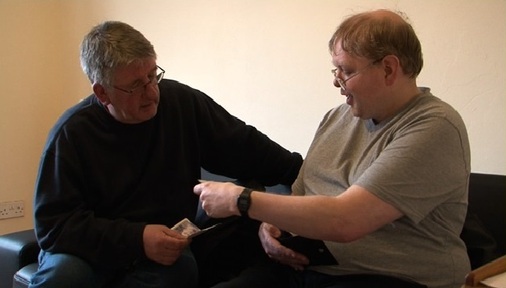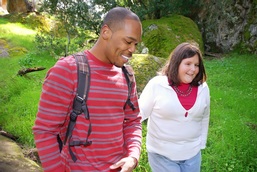Protecting disabled people from Mate crime – ‘The important thing isn't how we label Mate Crime. It is how we eradicate it’

Disability rights campaigners have highlighted a need for the community to have a greater awareness of mate crime.
The term mate crime has been attributed to the act of befriending a disabled people within the community with the intention of manipulating and exploiting them.
The phrase has been criticised in the past for not enforcing the seriousness of the crime, but awareness groups are demanding that it is necessary for as many people as possible to become aware of the hidden crime, and feel confident to report incidents.
Disability hate crime has been defined as ‘Any criminal offence that is motivated by hostility or prejudice based upon a person’s disability’, and mate crime has been labelled by the Association for Real Change (ARC) as a form of hate crime.
Disability campaigning website disabilityhatecrime.org has revealed that those with learning difficulties have a 20 per cent chance of being attacked every week, or even more regularly than that, and 47 per cent of people do not feel safe in their own homes, or in their local area, or decide to use public transport.
Mate crime often goes unnoticed due to the apparent friendship that the criminal has formed with the victim.
Rod Landman. Safety Net Officer of ARC said: “98 per cent of learning disability hate crime goes unreported. Experience from the ARC Safety Net project (arcuk.org.uk/safetynet) suggests the rate of unreported mate crime is even higher. People who experience mate crime rarely perceive it as a crime, and even when they do they are still very unlikely to report it.
“This is for many, often complicated reasons but sadly too many people are reluctant to tell on their 'friends' and lose that relationship, no matter how abusive or exploitative.”
Often starting as a friendship, mate crime can lead to the disabled victim being exploited, whether sexually, financially or physically, with this type of crime often committed in private.
Home care assistants in regular contact with disabled people at risk of mate crime in their own home are being encouraged to be aware and look out for any indication that this type of crime is occurring.
Signs which could indicate evidence of mate crime include changes in a person’s routine or behaviour, unexplained injuries or losing contact and becoming detached from usual networks and genuine relationships.
A person reporting that they are doing what a friend has told them to do, or a sudden shortage of money are also key indicators that a disabled person could be a victim of mate crime.
Mate hate crime campaigner and founder of the Disability Hate Crime Network, Stephen Brookes has described the importance of raising awareness in order to boost people’s confidence in reporting the crime.

He said: “Having friends, making new ones and maintaining the ones we have can be a difficult balancing act for anyone. But for disabled people this can be especially difficult as we may have less control over, and less ability to create, maintain and develop friendships.
“Disabled people do have real ‘mates’, but sadly in some cases a ‘mate’ of a disabled person is more easily described as a ‘fake’.
“When I first came across the term it was in my early days of dealing with hate crime, and I wondered if it was something new and more sinister. I tend to agree that the dictionary definition of hostility is already broad enough to include the kind of exploitation seen in these offences, and they cannot be viewed as anything other than hostile acts, and that in term of crimes committed under the guise of friendship we need to look more carefully at the offender and not the victim.”
Mr Brookes recalled a conversation with a senior local authority diversity police officer about the term mate crime and the differing in opinions over its appropriateness.
He said: “I can think of no better term which would encapsulate the idea of manipulative befriending of disabled people with the intent of taking advantage of them financially. Anything else which conveys the same idea would inevitably be more woolly and wordy. “Really though the important thing isn't how we label mate crime. It is how we eradicate it.”
Simon Green, a moderator of the Disability Hate Crime Network also said: “To me mate crime is the only term to use, if a disabled person is befriended then bullied, harassed, robbed, beaten, abused and /or killed by their "befriender" then its Mate Crime.
“Many do feel uncomfortable with the term but lots also feel uncomfortable about the term Hate Crime. I don’t think terms should be changed because people feel uncomfortable, because society should feel uncomfortable about it, and made far more aware.”

Charities have criticised the lack of action that is being taken by police services, after a report last year reported that disabled people are being let down by the criminal justice system at ‘ground level’.
Richard Hawkes, chief executive of Scope said: “Yet another report highlights real failure amongst police forces and the crown prosecution service in tackling disability hate.
“Until disabled people see the levels of prosecutions for disability hate crimes rise, they will continue to have little confidence that crimes against them will be taken seriously.
“We need to better understand why disabled people are being targeted in the first place.
“But we also need to build disabled people’s confidence in the justice system and this can only come from better support throughout the process – from initial reporting, through to prosecutions and sentencing where necessary.
“We know that if unchallenged these low level incidents can often escalate into more serious crimes.”
The Safety Net Project, created by the Association for Real Change and funded by the Department for Health encourages people to report any form of mate crime that they feel has occurred.
Mr Landman of ARC continued: “The Safety Net project has provided training on recognising and dealing with mate crime to hundreds of people with learning disabilities over the last four years.
“Crucially these training initiatives are also being delivered to care workers and families, as these are the people most likely to recognise when mate crime is taking place, and to be in a position to do something about it.”
Mr Landman concluded that the whole society has a role to play in eradicating mate crime and said: “The whole of society has a responsibility - neighbours, local shop keepers and PCSOs who are in contact with people with a learning disability on a daily basis. We need to be getting messages through to the people who really can form a safety net for individuals vulnerable to mate crime.”
For more information on mate crime visit: http://arcuk.org.uk/safetynet/files/2012/08/Friend-or-Fake-Booklet.pdf
Latest Features News
 28-Nov-19
2019 Election: Labour pledges £10.8 bn for free personal care while Boris Johnson sidelines social care
28-Nov-19
2019 Election: Labour pledges £10.8 bn for free personal care while Boris Johnson sidelines social care
 18-Oct-19
Podcast: Wendy Mitchell and dementia: 'My biggest fear is not knowing who my daughters are'
18-Oct-19
Podcast: Wendy Mitchell and dementia: 'My biggest fear is not knowing who my daughters are'
 30-Sep-19
World's oldest diver aged 96 says 'never accept the fact you are getting old'
30-Sep-19
World's oldest diver aged 96 says 'never accept the fact you are getting old'
 27-Sep-19
Exclusive: Care minister backs care workers' call for time off to grieve and attend funerals
27-Sep-19
Exclusive: Care minister backs care workers' call for time off to grieve and attend funerals
 20-Sep-19
Podcast: Gyles Brandreth urges care workers to learn poetry with elderly
20-Sep-19
Podcast: Gyles Brandreth urges care workers to learn poetry with elderly